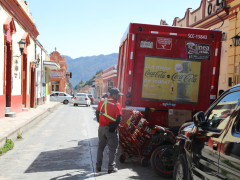According to a 2017 report by a coalition of environmental and civil rights groups, Femsa pays 2,600 pesos or $155 for each water permit in Mexico.
The report’s authors call that amount “absolutely ridiculous” when compared with the profits the companies make off the water.
Eduardo Gomez, a professor who wrote a study about Coca-Cola’s political influence in Mexico, credited the favourable deals to “the ease with which industry leaders have access to congressional and bureaucratic institutions”.
He pointed out, for example, that Vicente Fox was head of Coca-Cola Femsa before being elected Mexican president in 2000.
Mexico’s National Water Commission (CONAGUA), which is responsible for granting water concessions, did not respond to requests for comment about criticisms of the permit-granting process, how long the permits last and the extent of its deals with Coca-Cola across the country.
Coca-Cola now has a 70-percent market share of production and sales of soda in Mexico.
The Femsa-led operation runs more than 20,000 convenience stores nationwide, according to Marcos Arana, director of a nonprofit focused on improving healthcare for Indigenous communities in Chiapas. It even provides fridges to small shops that sell its products.
“They’re like narcomenudistas,” said Arana, likening the strategy to Mexican drug cartels who create large networks of small-time dealers. “That’s how Coca-Cola’s business model works. You can’t escape it.”
Femsa did not respond to requests for comment about its busi





